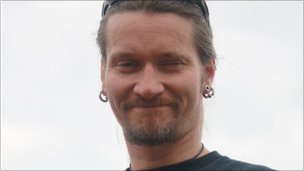
Pc Mark Kennedy worked undercover in the green movement for a number of years
The trial of six green campaigners has collapsed after an undercover policeman who had infiltrated their group offered to give evidence on their behalf.
The six were charged with conspiring to shut down the Ratcliffe-on-Soar power station in Nottingham in 2009.
The case was due to start on Monday, but was abandoned after Pc Mark Kennedy contacted the defence team to say he would be prepared to help them.
The prosecution subsequently dropped their case.
Mr Kennedy had been intimately involved in the green movement since 2000.
He was known to those within it as Mark “Flash” Stone, having earned the nickname because he always seemed to have more money than the other activists.
Confronted
He lived a double life as Mark Kennedy of the Metropolitan Police and as Mark Stone, green activist, based in Nottingham.
Danny Chivers, who was one of the six defendants in the failed case, said Mr Kennedy was not just an observer, but an agent provocateur.
“We’re not talking about someone sitting at the back of the meeting taking notes – he was in the thick of it.”
Mr Kennedy would disappear for extended periods, saying he had to visit his “brother” in the US.
In October 2010, Mr Kennedy was confronted by some of the activists after they found documents which revealed his true identity.
He admitted he had been a Met Police officer and had infiltrated their organisations, before then disappearing.
Speaking about the Ratcliffe-on-Soar protest, Mr Chivers said: “Mark Stone was involved in organising this for months – they could have stopped it at the start.”
Instead, Mr Chivers said the police officer helped recruit as many people as possible.
He also drove a reconnaissance party to the power station in his van and then hired a truck for the main protest, Mr Chivers added.
The activists’ plan was to try to shut down the coal-fired power station for a few days as a protest against global warming.
But in April 2009, when 114 people had gathered for a meeting at the Iona School in Nottingham, hundreds of police swooped on the building and arrested them all for “conspiracy to commit aggravated trespass”.
Twenty were convicted late last year.
Ratcliffe-on-Soar was one of many actions in Britain and across Europe which Mr Kennedy was involved in, including the protests against the G8 summit at Gleneagles in 2005 which helped give birth to the Climate Camp movement.
“He was one of the key people setting up Gleneagles 2005,” said Mr Chivers, who also claimed the undercover officer drove protesters there in his van.
‘Violated’
Activist websites are full of denunciations of Mr Kennedy by former close friends.
There is some abuse, but most say they feel “violated”, “betrayed” and “sickened”.
One writes: “He must be a deeply conflicted individual.”
When confronted, Mr Kennedy told the activists he left the police after the Nottingham arrests in 2009.
It is unclear whether this is true, or where he is now, but he contacted the activists’ defence team to say he would be prepared to help their case.
When the defence then asked the prosecution to disclose full details of Mr Kennedy’s activities the prosecution dropped the case.
Mike Schwarz, a solicitor at Bindmans law firm which represented the activists, said he had “no doubt that our attempts to get disclosure about Kennedy’s role has led to the collapse of the trial”.
He added: “It is no coincidence that just 48 hours after we told the CPS our clients could not receive a fair trial unless they disclosed material about Kennedy, they halted the prosecution.
“Given that Kennedy was, until recently, willing to assist the defence, one has to ask if the police were facing up to the possibility their undercover agent had turned native.”
A CPS spokeswoman said: “Previously unavailable information that significantly undermined the prosecution’s case came to light on Wednesday, 5 January 2011.
“In light of this information, the Crown Prosecution Service reviewed the case and decided there was no longer sufficient evidence for a realistic prospect of conviction.”
The Met Police are refusing to comment officially on Mr Kennedy and would not say whether or not he is still a police officer.
10 January 2011 Last updated at 13:11 GMT
Source: BBC NEWS